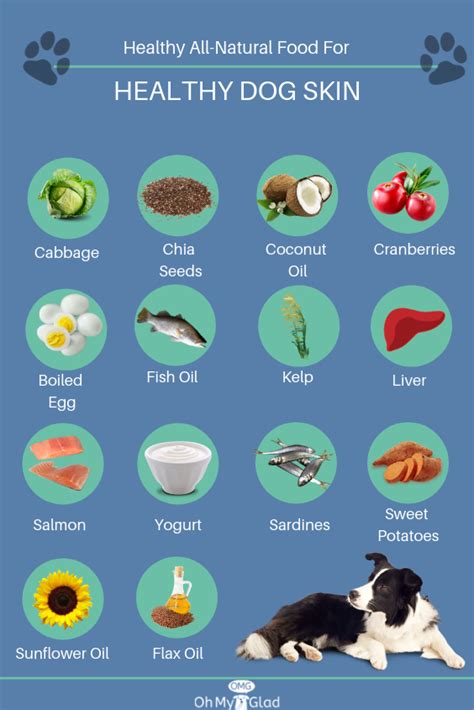Introduction
The skin, the largest organ of the canine body, is a crucial indicator of overall health. Just as humans experience skin problems due to underlying health issues, dogs too can suffer from a range of skin conditions that may stem from dietary deficiencies. Maintaining a healthy skin requires a comprehensive approach that includes balanced nutrition as a cornerstone.

The Importance of Nutrition for Healthy Skin
The skin is composed of several layers, each with distinct functions. The outermost layer, the epidermis, acts as a barrier against external threats, while the inner layer, the dermis, provides structural support and contains essential components like hair follicles and blood vessels.
Proper nutrition plays a vital role in supporting the health of each skin layer:
- Proteins: Provide building blocks for collagen and keratin, the structural components of the skin.
- Fats: Essential for moisture retention, cell function, and hormone production. Omega-3 and omega-6 fatty acids are especially beneficial for reducing inflammation and promoting skin health.
- Carbohydrates: Supply energy for cell growth and repair.
- Vitamins: Provide antioxidant protection and support immune function. Vitamins A, E, and C are crucial for skin health.
- Minerals: Promote skin integrity and vitality. Zinc and selenium are essential for cell renewal and wound healing.
How to Choose Dog Food for Optimal Skin Health
Dietary choices can significantly impact skin health. When selecting dog food, consider the following factors:
1. Ingredient Quality: Opt for foods with high-quality protein sources, such as whole meats, poultry, or fish. Avoid fillers like corn, wheat, or soy, which can contribute to allergies.
2. Fat Content: Look for foods containing between 7-19% fat, depending on the dog’s age, activity level, and skin condition. Omega-3 and omega-6 fatty acids should be balanced for optimal skin health.
3. Carbohydrate Source: Choose foods with digestible carbohydrate sources, like brown rice or oats, that provide sustained energy without causing digestive issues.
4. Vitamin and Mineral Supplementation: Ensure your dog’s food provides adequate levels of vitamins and minerals. Consider supplementing with specific vitamins or minerals, such as biotin for skin elasticity or zinc for wound healing, if necessary.
5. Avoid Allergens: If your dog has allergies, carefully choose foods that do not contain potential allergens, such as beef, chicken, wheat, or dairy.
Common Skin Problems in Dogs and Nutritional Considerations
Various skin problems can affect dogs, each requiring a tailored nutritional approach:
1. Allergies: Food allergies can manifest as itchy skin, hives, or digestive issues. Identifying and eliminating allergens from the diet is crucial for managing allergies.
2. Dry Skin: Lack of moisture, skin infections, or underlying health issues can cause dry skin. Ensure sufficient hydration, use moisturizing shampoos, and consider adding essential fatty acids to the diet.
3. Otitis: Inflammation of the ear canal can be caused by bacteria, yeast, or allergies. A balanced diet that supports the immune system and reduces inflammation can be beneficial.
4. Skin Infections: Bacterial or fungal skin infections can cause itching, redness, and discomfort. Antimicrobial and antifungal diets may be recommended to treat these infections.
5. Demodectic Mange: This parasitic skin condition causes hair loss and irritation. A diet high in protein, essential fatty acids, and zinc can help support the immune system and combat the infestation.
Emerging Trends in Dog Food and Skin Health
The pet food industry is constantly evolving, with new trends emerging to address the changing needs of dogs. Here are some future-forward developments:
1. Personalized Nutrition: DNA testing and advanced technology are paving the way for personalized pet diets tailored to individual health needs and skin conditions.
2. Prebiotics and Probiotics: These supplements promote a healthy gut microbiome, which is linked to improved skin health and overall well-being.
3. Skin-Specific Ingredients: Innovative ingredients, such as ceramides, hyaluronic acid, and collagen peptides, are being incorporated into dog foods to target specific skin concerns.
4. Telemedicine for Skin Care: Veterinary telemedicine platforms offer convenient and accessible consultations for diagnosing and treating skin problems remotely.
Conclusion
Maintaining healthy skin in dogs requires a comprehensive approach that includes balanced nutrition. By understanding the needs of the skin and choosing dog food wisely, pet owners can support a radiant and healthy coat in their beloved companions. As the field of pet nutrition continues to advance, emerging trends and technological innovations will further enhance the well-being of our canine friends.





















